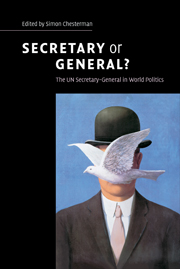Book contents
- Frontmatter
- Contents
- Contributors
- Foreword
- Acknowledgements
- Introduction: secretary or general?
- PART I Defining and refining the job description
- PART II Maintaining peace and security
- PART III Normative and political dilemmas
- PART IV Independence and the future
- APPENDIX: selected documents on the Secretary-General
- 1 Charter of the United Nations, 26 June 1945
- 2 Report of the Preparatory Commission of the United Nations, 23 December 1945
- 3 General Assembly Resolution 11(I), 24 January 1946
- 4 The “Wisnumurti Guidelines” for Selecting a Candidate for Secretary-General, 12 November 1996
- 5 General Assembly Resolution 51/241, 22 August 1997
- 6 Canadian Non-Paper on the Process for the Selection of the Next Secretary-General, 15 February 2006
- 7 General Assembly Resolution 60/286, 8 September 2006
- Select bibliography
- Index
7 - General Assembly Resolution 60/286, 8 September 2006
Published online by Cambridge University Press: 06 January 2010
- Frontmatter
- Contents
- Contributors
- Foreword
- Acknowledgements
- Introduction: secretary or general?
- PART I Defining and refining the job description
- PART II Maintaining peace and security
- PART III Normative and political dilemmas
- PART IV Independence and the future
- APPENDIX: selected documents on the Secretary-General
- 1 Charter of the United Nations, 26 June 1945
- 2 Report of the Preparatory Commission of the United Nations, 23 December 1945
- 3 General Assembly Resolution 11(I), 24 January 1946
- 4 The “Wisnumurti Guidelines” for Selecting a Candidate for Secretary-General, 12 November 1996
- 5 General Assembly Resolution 51/241, 22 August 1997
- 6 Canadian Non-Paper on the Process for the Selection of the Next Secretary-General, 15 February 2006
- 7 General Assembly Resolution 60/286, 8 September 2006
- Select bibliography
- Index
Summary
Revitalization of the General Assembly
Annex
The General Assembly, …
Cluster II. Selection of the Secretary-General
17. Recalls Article 97 of the Charter, as well as the provisions of General Assembly resolutions 11(I) of 24 January 1946 and 51/241, as relevant to the role of the Assembly in appointing the Secretary-General, upon the recommendation of the Security Council;
18. Emphasizes, bearing in mind the provisions of Article 97 of the Charter, the need for the process of selection of the Secretary-General to be inclusive of all Member States and made more transparent and that, in the course of the identification and appointment of the best candidate for the post of Secretary-General, due regard should be given to regional rotation and gender equality, and invites the Security Council to regularly update the General Assembly on the steps it has taken in this regard;
19. Encourages, without prejudice to the role of the principal organs as enshrined in Article 97 of the Charter, the President of the General Assembly to consult with Member States to identify potential candidates endorsed by a Member State and, upon informing all Member States of the results, to forward those results to the Security Council;
20. Also encourages formal presentation of candidatures for the position of Secretary-General in a manner that allows sufficient time for interaction with Member States, and requests candidates to present their views to all States members of the General Assembly;
[…]
- Type
- Chapter
- Information
- Secretary or General?The UN Secretary-General in World Politics, pp. 260 - 261Publisher: Cambridge University PressPrint publication year: 2007
- 3
- Cited by



